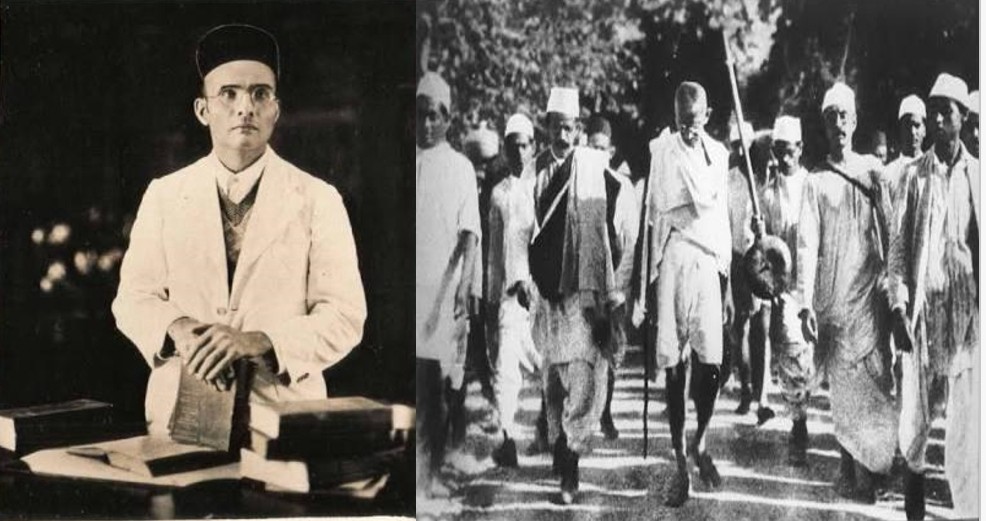The Quit India Movement (QIM) also known as the ‘August Kranti’ (August Revolution) was a nation-wide Civil Disobedience Movement for which a call was given on August 7, 1942 by the Bombay session of the All-India Congress Committee. It was to begin on August 9 after Gandhi’s call to ‘Do or Die’ in his Quit India speech delivered in Bombay at the Gowalia Tank Maidan on August 8. Since then, August 9 is celebrated as August Kranti Divas.

The British responded swiftly with mass detentions on August 8, itself. Over 100,000 arrests were made which included the total top leadership of Congress including Gandhi, mass fines were levied and demonstrators were subjected to public flogging.
Hundreds of civilians were killed in violence, many shot by the police and army. Many national leaders went underground and continued their struggle by broadcasting messages over clandestine radio stations, distributing pamphlets and establishing parallel governments. Innumerable patriotic Indians were shot dead for the crime that they were holding Tricolour publically. Even before this brute killing, a terrible massacre took place in Mysore where the armed forces of Mysore Raja who was closely associated to both the Hindu Mahasabha and the RSS shot dead 22 Congress activists for saluting, believe it or not, the Tricolour.
What 2019 India, millennials and post millennials, forget, or choose not to remember, Is that the British declared the Congress ‘an anti-national and unlawful organization’, but allowed only Hindu Mahasabha and the Muslim League to function, The entire Hindutvacamp ganged up to serve the British masters, They not only opposed the QIM but also provided multi-faceted and multi-dimensional support to the British rulers in suppressing this historic mass upsurge. There are revealing documents that prove this: read them to believe this,
SAVARKAR’S CALL FOR ”RESPONSIVE COOPERATION’ WITH BRITISH RULERS
While addressing the 24th session of the Hindu Mahasabha at Cawnpore (now Kanpur) in 1942, Savarkar outlined the strategy of the Hindu Mahasabha of co-operating with the British in the following words:
“The Hindu Mahasabha holds that the leading principle of all practical politics is the policy of Responsive Co-operation. And in virtue of it, it believes that all those Hindu Sangathanists who are working as councillors, ministers, legislators and conducting any municipal or any public bodies with a view to utilize those centres of government power to safeguard and even promote the legitimate interests of the Hindus without, of course, encroaching on the legitimate interests of others are rendering a highly patriotic service to our nation…The policy of responsive co-operation which covers the whole gamut of patriotic activities from unconditional co-operation right up to active and even armed resistance, will also keep adapting itself to the exigencies of the time, resources at our disposal and dictates of our national interest.” [Italics as in the original]
HINDUTVA ICON DR SYAMA PRASAD MOOKERJEE DEPUTY CM IN THE BENGAL MUSLIM LEAGUE MINISTRY TOOK UP THE RESPONSIBILITY OF CRUSHING THE QIM IN BENGAL
Following the Hindu Mahasabha directive to co-operate with the British, Hindutva’s icon, Dr. Mookerjee assured the British masters through a letter dated July 26, 1942.
Shockingly, it read:
“Let me now refer to the situation that may be created in the province as a result of any widespread movement launched by the Congress. Anybody, who during the war, plans to stir up mass feeling, resulting internal disturbances or insecurity, must be resisted by any Government that may function for the time being”
The second-in-command of the Hindu Mahasabha, Dr Mookerjee, also the deputy chief minister in Bengal Muslim league ministry in a letter to the British Bengal governor on behalf of Hindu Mahasabha and Muslim League made it clear that both these parties looked at the British rulers as saviours of Bengal against QIM launched by Congress. Assuring him, the letter said:
“Indian have to trust the British, not for the sake for Britain, not for any advantage that the British might gain, but for the maintenance of the defence and freedom of the province itself.”
With this ‘anti-national record’ of ‘Veer’ Savarkar available in the Hindu Mahasabha archives itself; it would amount to a denigration of hundreds of martyrs and victims of the British colonialists attacked and imprisoned during QIM if Savarkar is today honoured with Bharat Ratna. No self-respecting nation should allow it to happen.
(The views of the author are personal; former prime minister, Indira Gandhi issued a commemorative stamp in Savarkar’s name)